A new study adds evidence to the argument that exercise can help preserve brain health, particularly in the ageing brain.
What makes this study different than most is a wrinkle in its methodology. Unlike many studies that look for a connection between exercise and brain health, this one used a specific way of measuring physical fitness, by testing the participants’ maximum oxygen consumption during aerobic exercise (known as the V02 max test, it’s a method recognized by the American Heart Association as an objective way of analyzing cardiovascular fitness--more reliable than people just self-reporting on how fit they think they are).
The study included 81 participants, 53 of whom had been diagnosed with mild cognitive impairment (MCI)—a condition characterized by memory and reasoning problems that aren’t yet severe enough to interfere with self-care. As many as 20% of those 65 and older in the general population may have some level of MCI, according to the Alzheimer's Association. The remaining 26 healthy participants served as the control group.
All of the participants took a V02 max aerobic test on a treadmill (similar to a cardio stress test that lasts about 10 minutes). They also completed tests of memory and reasoning, and their brains were examined with a type of brain scan called diffusion tensor imaging (DTI)that reveals the health of the brain’s white matter. Increasingly research is showing that the integrity of white matter—where billions of neurons are bundled together—is an indication of how well brain areas communicate. As white matter breaks down with age, the highways connecting parts of the brain erode.
Two results from the study point to the potential importance of exercise for the aging brain. The first was that lower levels of aerobic fitness (as measured by VO2 max) were linked with the weaker white matter in certain parts of the MCI participants’ brains. This wasn’t an exhaustive, brain-wide finding. In many ways, the brains of the MCI participants and the healthy control group were not very different, but the researchers report that differences in white matter integrity were significant in particular brain areas involved in "executive and memory function."
The second result was that the MCI participants with lower aerobic fitness and weaker white matter also performed worse on the memory and reasoning tests. Taken together, the results suggest that greater physical fitness correlates with healthier white matter, which in turn correlates with better memory and reasoning abilities even for those already suffering from a level of cognitive impairment.
"This research supports the hypothesis that improving people's fitness may improve their brain health and slow down the aging process," said lead study author Dr. Kan Ding, a neurologist from the Peter O'Donnell Jr. Brain Institute.
What these results tell us about the role exercise might play in slowing the development of Alzheimer’s is difficult to nail down. While studies like this suggest that exercising more strengthens the brain against the debilitation leading to severe dementia, definitive answers are still elusive. We don’t know, for example, the amount of exercise that makes a difference, if specific types of exercise are better than others, or whether starting exercise later in life can forestall the progression of dementia.
What we do have are solid indications that we should think of exercise and brain health in a similar way to exercise and heart health. Some of the same benefits exercises provide the heart—like improved blood flow and lower inflammation—also benefit the brain. More evidence along those lines keeps coming, further supporting the case that staying active is a better policy for brain health than the alternative.
The study was published in the Journal of Alzheimer's Disease.
Click Here For More Articles
Don't forget to opt-in to Our Healthy Living Society and get 3 free gifts while receiving the latest information on health, well-being and groundbreaking news about natural nutrition.


No comments:
Post a Comment